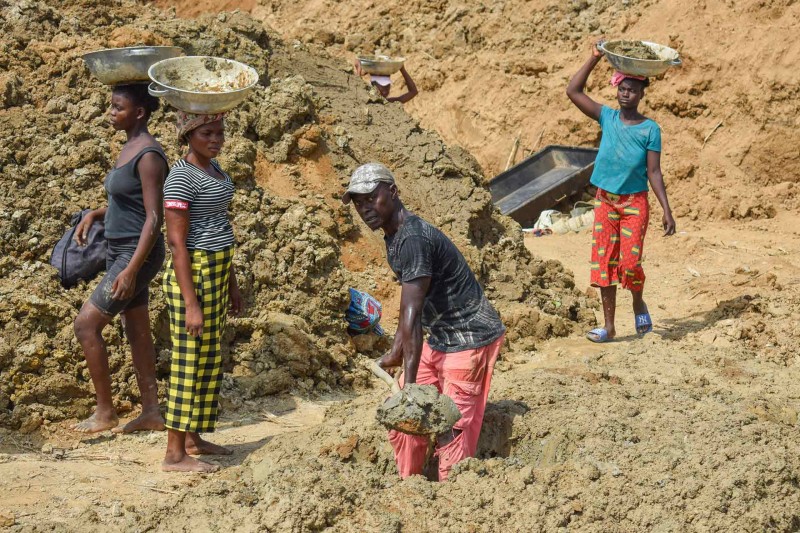“The money is not good and the work is hard,” he says. After 20 years of working as a digger, he has little to show for it – his daily wage remains barely enough to provide food and shelter for his wife and four children.
Meanwhile, the diamonds that Dia and tens of thousands of others like him have extracted from Kono’s soils have sold for billions in international markets.
Diamonds from the fields around the Kono District capital of Koidu, one of the richest diamond deposits in the world, once fuelled Sierra Leone’s brutal decade-long civil war.
This changed in 1995 with the arrival of South African mercenary outfit Executive Outcomes, which took control over the city’s diamond fields from the Revolutionary United Front rebel group.
Control was subsequently secured by a government-granted mining concession – a reward for the military assistance. The event marked the beginning of Koidu Limited.
Now owned by Israeli mining magnate Beny Steinmetz’s BSG Resources, the company has played a defining role in the local diamond industry ever since.
To expand its original mining operations, the company destroyed a significant proportion of the city and its surrounding, evicting hundreds from their homes. This caused major disruption to local livelihoods, destroying swaths of farmlands, polluting the air and contaminating underground water in the area.
Those protesting the expansion were intimidated by police forces co-opted by Koidu Limited. In several instances, protesters were shot and killed.
Aside from the provision of inadequate substitute housing to a number of evicted residents, communities in Koidu have not received compensation for damages. Nor have they seen much of the wealth generated from the exploitation of their land.
The city has few paved roads and no running water. Electricity runs for just a few hours in the evening and, contrary to initial promises, the company has created only a limited number of poorly paid jobs.
Koidu Limited contested claims that it had done damage to the community, and noted that last month the High Court in Makeni ruled in the company’s favor against a lawsuit filed by a group representing evicted Koidu residents. The group said it would appeal the verdict.
Koidu Limited had “fulfilled all of its commitments to the welfare of the communities within which it operates” and the company’s relationship with the community was “exceptionally positive”, said Ibrahim Turray, Head of Corporate Affairs at Koidu Limited.
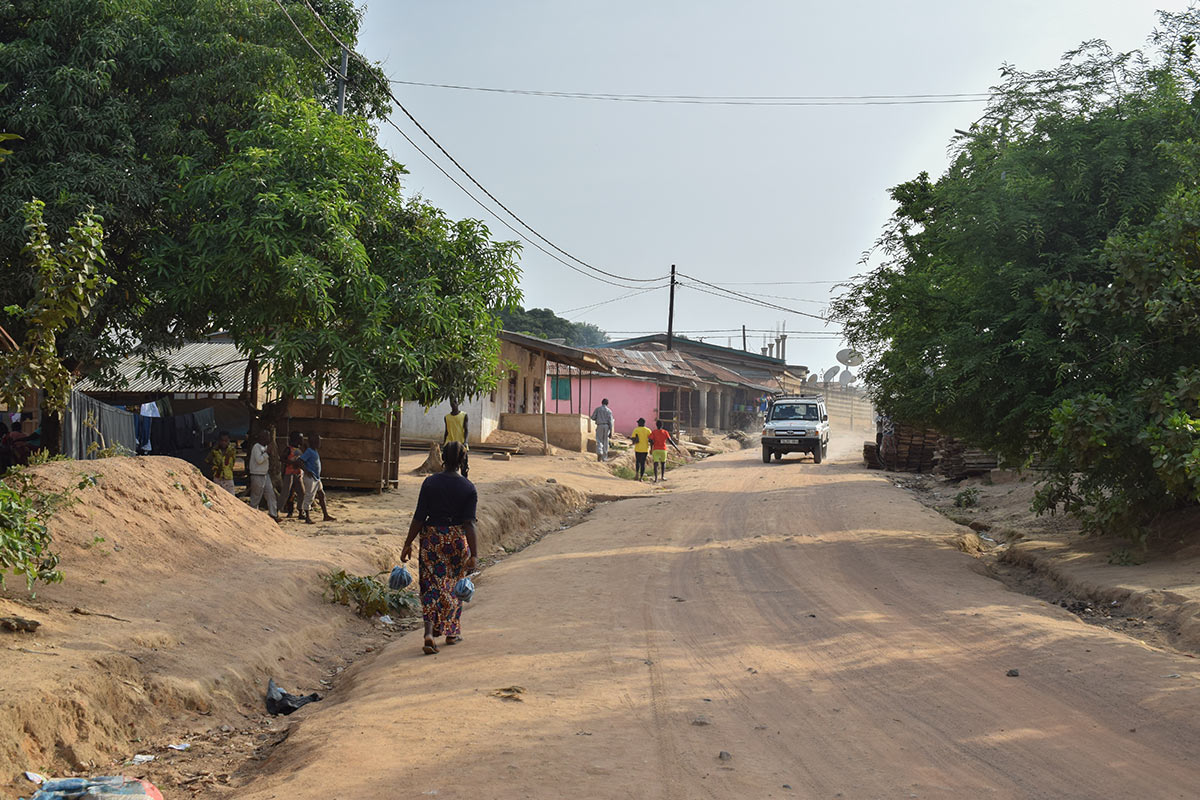 Koidu. The city has little to show for the diamond wealth extracted from the surrounding soils. (Photo: Josef Skrdlik/OCCRP)
Koidu. The city has little to show for the diamond wealth extracted from the surrounding soils. (Photo: Josef Skrdlik/OCCRP)
But Arthur Kargbo, a local activist, disagreed. “They are taking our diamonds but people do not benefit,” he tells OCCRP.
To make a living, many residents have had to rely on artisanal mining, digging in the surrounding jungles with pickaxes and shovels in search of diamonds.
“Basically everyone in Kono is somehow dependent on artisanal diamonds,” says Ibrahim Bockarie, a local community advocate.
Some estimates suggest that artisanal diamond mining could directly employ as many as 300,000 people, producing around 40% of Sierra Leone’s diamonds. Characterised by a complex production mode, the industry is notoriously exploitative.
Without Capital, You Become a Slave
Every morning, streams of people head from Kono’s towns and villages to the bush looking for work. Arriving at the pits — deep, waterlogged, muddy sores dotting the landscape — they begin to ask for work, addressing managers of individual artisanal mines.
If lucky enough to find employment for the day, the diggers, clad in little more than ragged T-shirts and baseball caps, wade barefoot into the mud. Shovels in hand, they excavate the earth to a depth of up to 20 meters. Long chains of people stretch from the depths of the pit to the surrounding walls, as buckets of unsieved gravel are passed from person to person.
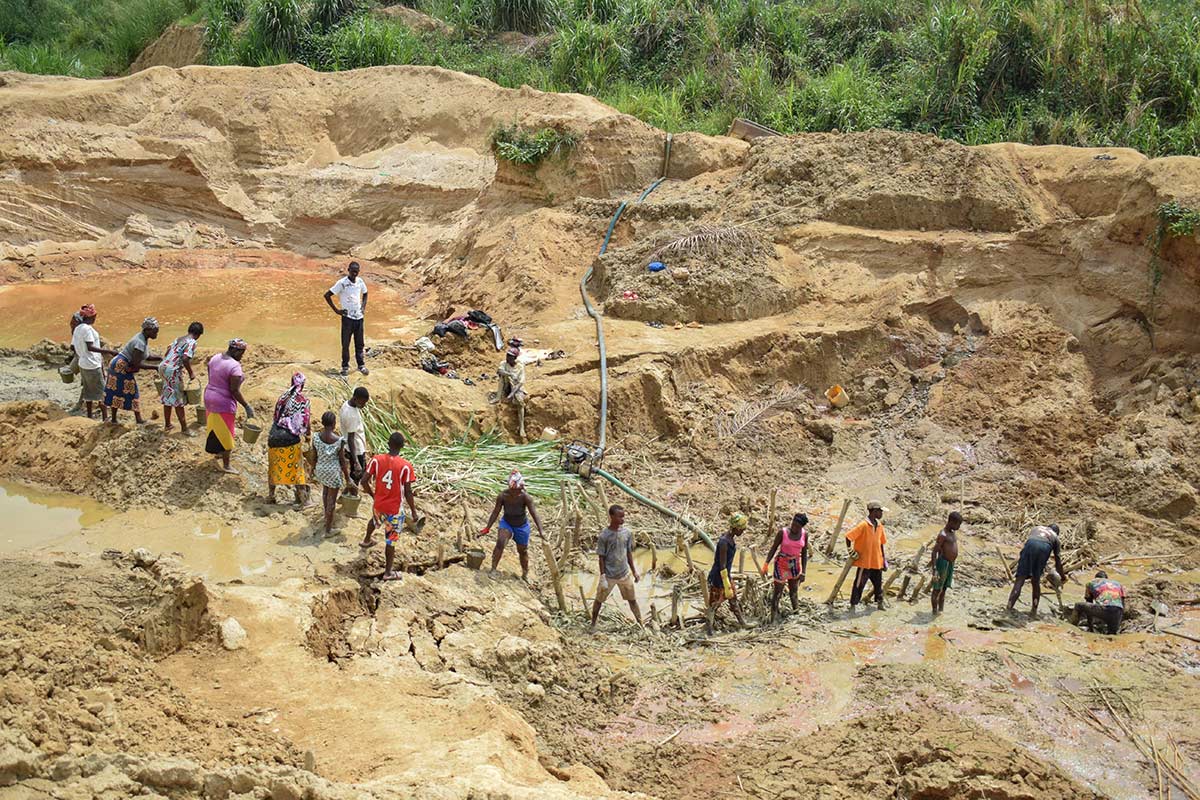 Artisanal diamond mine on the outskirts of Koidu. Diggers forming a chain to remove the gravel for subsequent sieving. (Photo: Josef Skrdlik/OCCRP)
Artisanal diamond mine on the outskirts of Koidu. Diggers forming a chain to remove the gravel for subsequent sieving. (Photo: Josef Skrdlik/OCCRP)
This gravel is later washed and sieved in search of the precious gems.
Throughout the year, temperatures regularly top 35°C, with little respite from the sun to be found in the pits. Injuries are common, with diggers frequently suffering from deep cuts and lacerations from sharp stones hidden in the mud.
All this for $2-3 a day. But diggers have learned to be resourceful.
Rice, the staple food of the Sierra Leonean diet, is usually sold only in bulk. To purchase a 25-kilogram bag, enough to feed a family of four for two weeks, diggers are often compelled to take out loans to cover the $17 cost. If purchased on credit, one bag can eventually cost up to $44 after interest.
“To make a stew, they will also buy broken pieces of dried fish, palm oil, margarine and pepper, which they mix with cassava leaves from their back garden,” says Princeton Williams, a manager of one the local artisanal mines. “With this method, they can survive.”
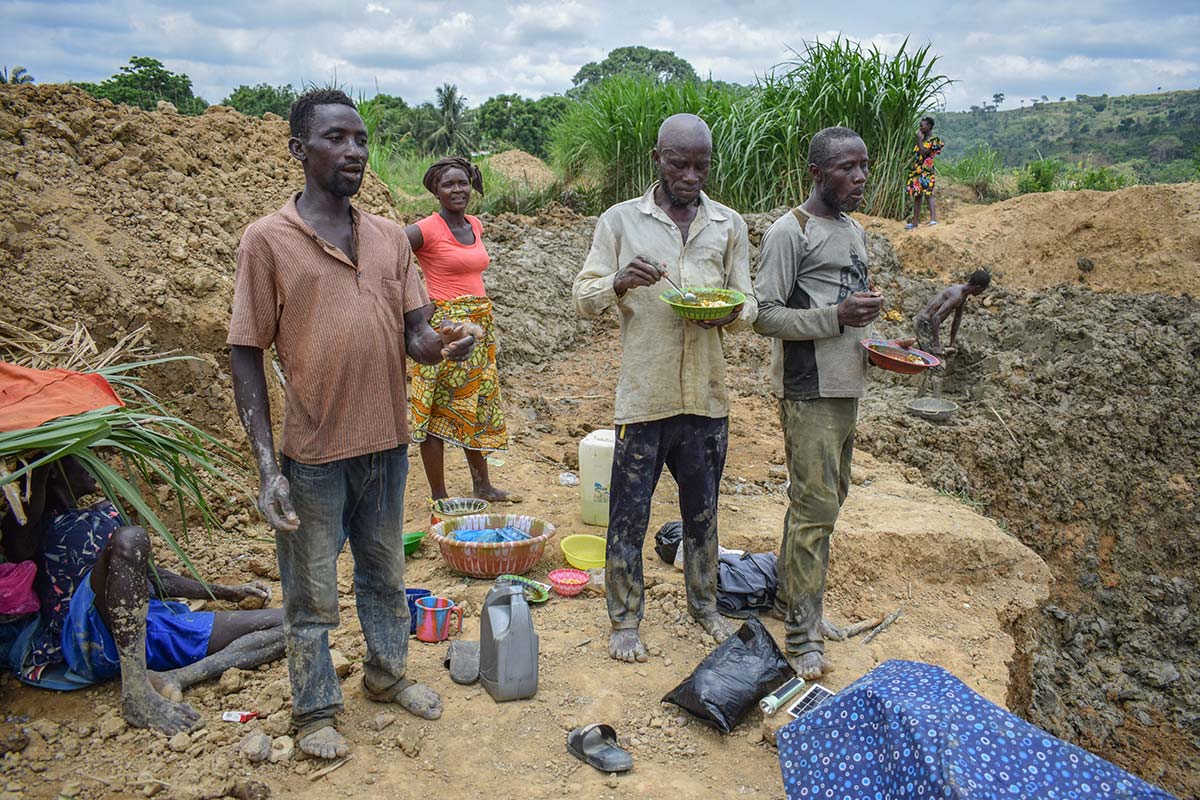 Lunch break. Diggers getting a bowl of rice with fish and cassava leaf. For many, this is their only meal for the day. (Photo: Josef Skrdlik/OCCRP)
Lunch break. Diggers getting a bowl of rice with fish and cassava leaf. For many, this is their only meal for the day. (Photo: Josef Skrdlik/OCCRP)
In the absence of alternative sources of income, diggers tend to have no option but to accept these conditions.
“It is a question of class,” says Sahr Joe, a mining expert from the Network For Justice and Development, a Sierra Leonean NGO. “If you don’t have money, you become a slave.”
A Tightly Structured Mode of Production
Because of the exploitative conditions, the predominant form of artisanal mining earned the epithet ‘Kosovo’ – in reference to the brutality of the conflict in former Yugoslavia.
In the Kosovo system, diggers work just for a daily rate and are not eligible for any share of the gains from the diamonds found. All the profit goes to the plot owners and their financiers, known locally as ‘supporters’.
In a typical setting, owners of land believed to contain diamonds search for people ready to help finance the mining operations, pay wages to workers and supply tools and machinery. Supporters are drawn primarily from Kono’s financial elite.
Plot owners typically receive 30% of the profits from a diamond, with supporters receiving the remaining 70%.
In recent years, the once-informal artisanal mining sector has undergone a process of marked formalization.
For mining to commence, supporters must first purchase a license from the National Mining Agency (NMA). If land is owned communally, they must also negotiate and obtain approval from the local tribal chief.
NMA officials pay regular visits to sites, checking that operators possess a license and that records are kept for diamonds found.
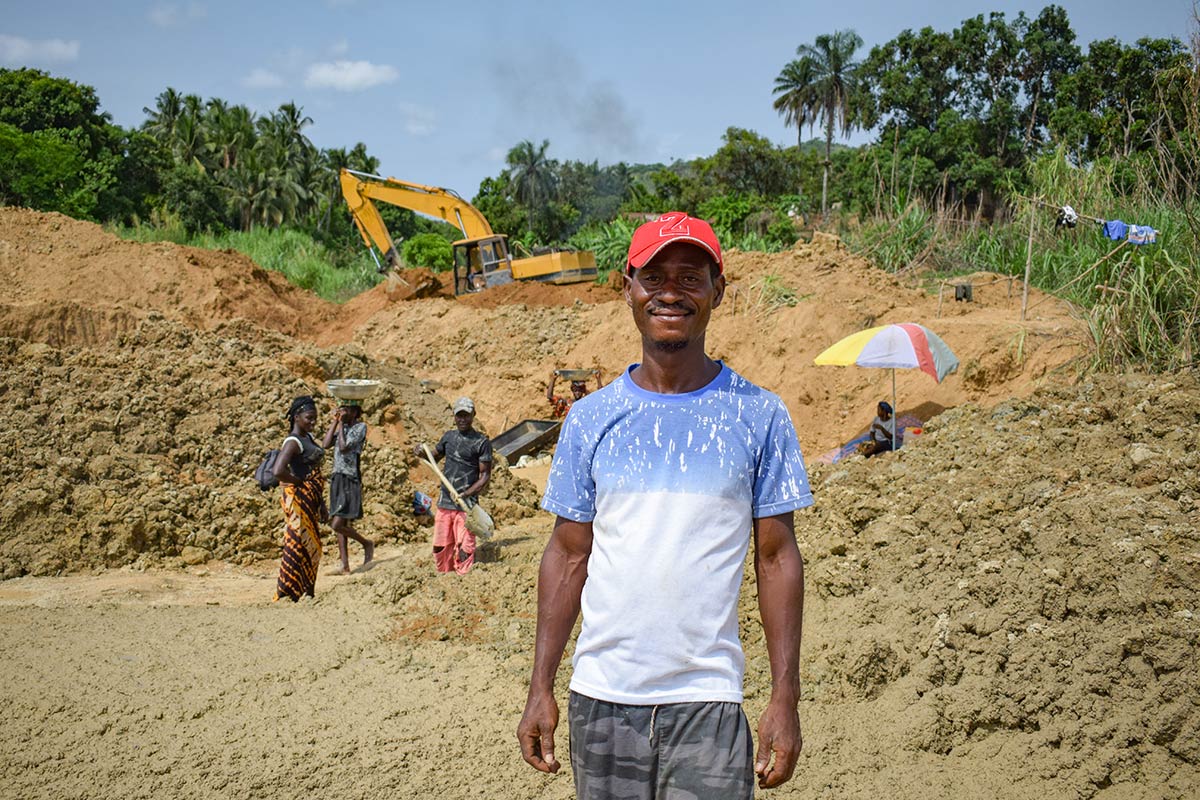 A local landowner, overseeing an artisanal mine he is operating jointly with his supporter. (Photo: Josef Skrdlik/OCCRP)
A local landowner, overseeing an artisanal mine he is operating jointly with his supporter. (Photo: Josef Skrdlik/OCCRP)
Still, much of the artisanal mining activity taking place in and around Koidu continues to escape government oversight.
One supporter, who asked to remain anonymous, admits to operating entirely without a license.
“If NMA comes, I just give them $5 and they leave me alone. Their staffers are all very poor,” he says. “To get approval from the chief, I bought him a TV.”
Alternative Arrangements
While the Kosovo system has come to dominate the artisanal mining sector, there are alternative ways for diggers to participate in the diamond economy.
In the so-called ‘Tributor System’, diggers can be paid less — typically under $1 a day — but if they find a diamond, they can get a share from the profit. The supporter negotiates the value of the found stone with the digger and they divide the profits among themselves.
Diggers tend to be attracted to this system due to the prospect of finding sizable gems.
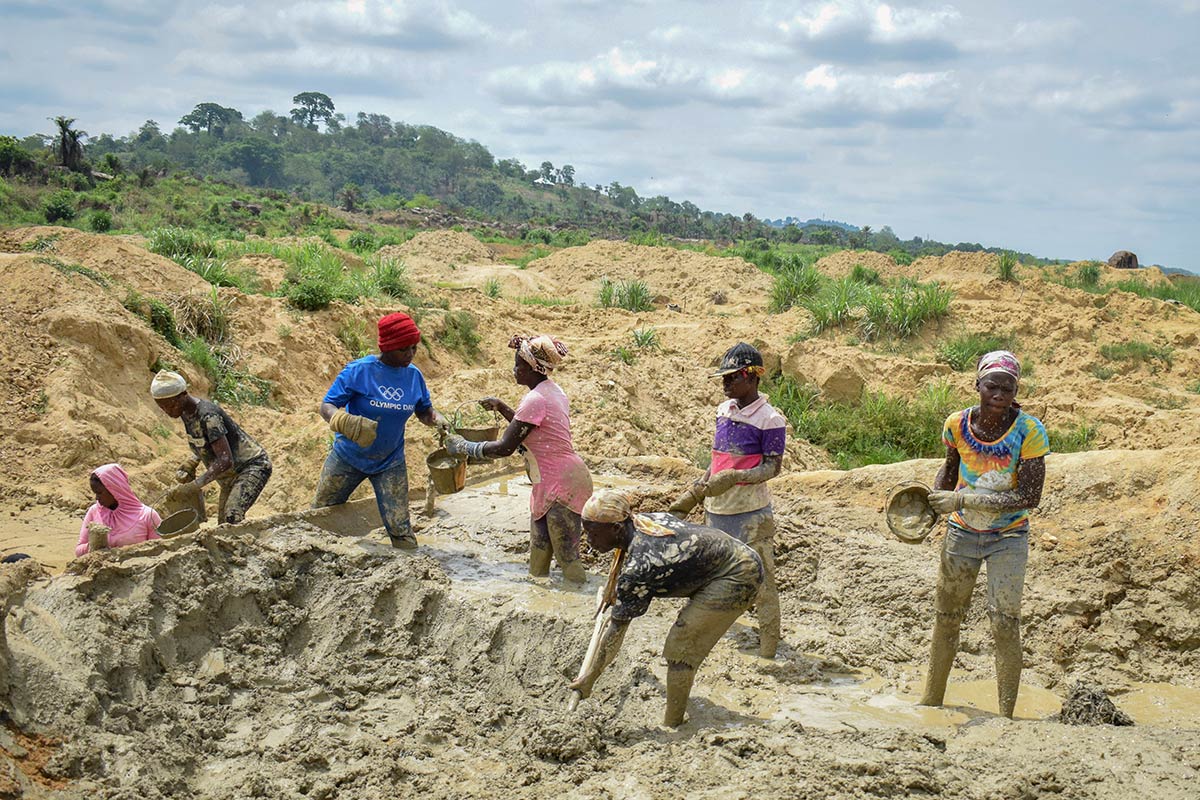 Artisanal diggers on the outskirts of Koidu. (Photo: Josef Skrdlik/OCCRP)
Artisanal diggers on the outskirts of Koidu. (Photo: Josef Skrdlik/OCCRP)
“I hope that one day, I will make a fortune,” says Kai Pessima, who has worked as a digger for over 25 years. However, he complains the money his supporter pays him for the diamonds is never fair.
Aiah Lahai, who also spent over 25 years in the diamond pits, has had comparatively better fortune. Some years ago, he uncovered a diamond that enabled him to buy three small houses for his children.
Despite this, he remains convinced that the sum he was given was insufficient.
If the diggers disagree with the price offered by the mine owner’s supporter, the informally agreed employment terms allow them to bring the diamond to a dealer for independent valuation.
There is a catch, however.
Diamond Prices Are Often Unfair
Diamond dealers, who operate from dozens of little shops that line the streets of Koidu, act as intermediaries between supporters and exporters in Freetown.
A dealer’s position in the supply chain is maintained through valuation skills. One has to be knowledgeable about the thousands of classes of diamonds. Dealers also oversee a vast network of agents working throughout Kono, who approach miners in order to maintain a steady supply of gems to their shops.
“To be a good dealer, you need to know diamond prices better than others,” says Brima Lebbie, a local dealer and candidate for the chair of the Kono District Diamond Dealers Association.
While Brima admits that diamond dealers are not always entirely forthcoming when it comes to the valuation of gems, he insists that this is an essential part of the industry.
“This is the business of the profit,” he says. “If the diamond prices were laid on the table and everybody knew the value, we might as well give up on mining and leave the diamonds in the ground.”
Despite ostensibly operating independently, diamond dealers often coordinate their prices, effectively acting as cartels.
If a digger takes a diamond to the dealer and does not accept the price, information about the gem and the offered price spreads quickly among the dealers, who then refuse to pay more than was initially offered.
“The more the digger moves around with his diamond to get a better price, the more the dealers spread information about the diamond,” says Sahr Joe. “Eventually the miner will most times be left with no option but to either accept the first price or go below that.”
Exploitation Fuels Diamond Smuggling
Once bought, the diamonds are transported to the capital of Freetown and certified by licensed exporters to enter international markets.
However, not all diamonds uncovered in Sierra Leone are exported legally. Diamond smuggling, notoriously rampant during the civil war, remains a significant problem. According to one estimate, between 50-90% of gems are smuggled out of the country, depriving the state treasury of potential export royalties.
Smuggling is driven in particular by precarious employment conditions and inadequate wages in the sector.
“The peasants steal the diamond from the supporter and sell it because the life of diggers is hard,” says Sahr Joe.
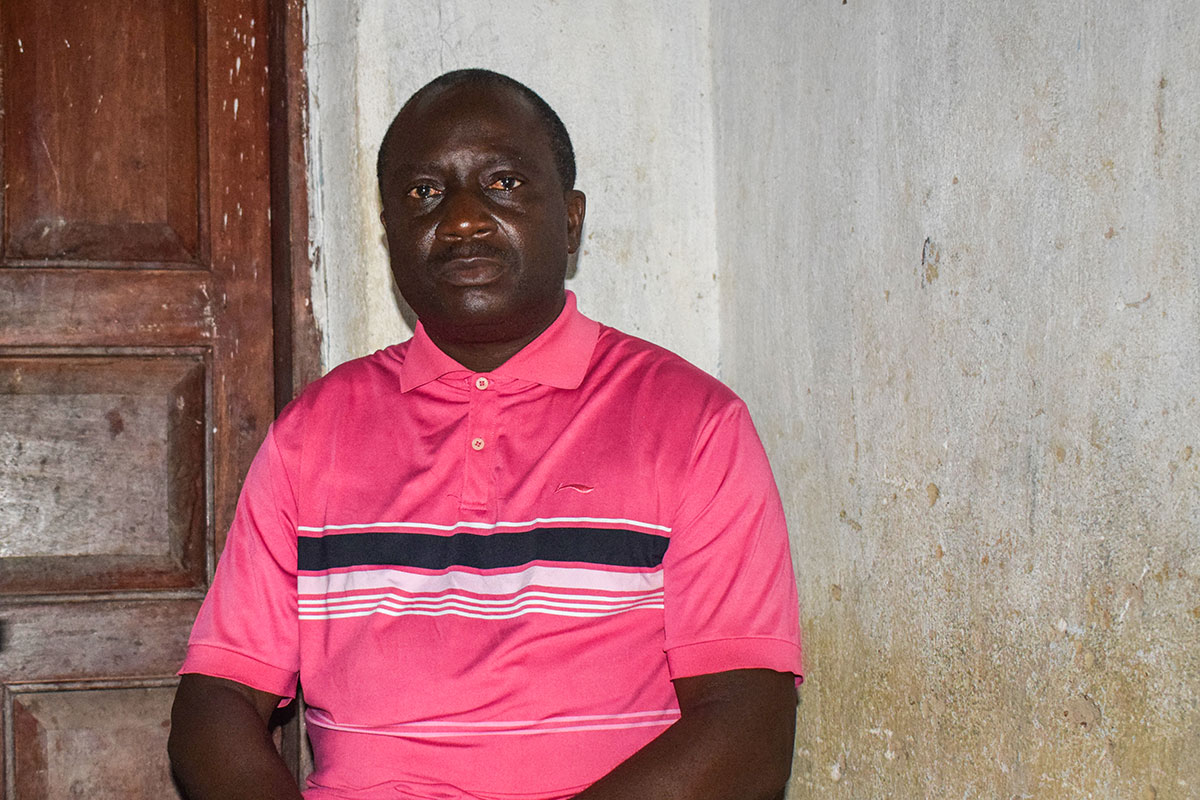 Sahr Joe, a mining expert from the Network For Justice and Development. (Photo: Josef Skrdlik/OCCRP)
Sahr Joe, a mining expert from the Network For Justice and Development. (Photo: Josef Skrdlik/OCCRP)
The most prominent smuggling route leads through Guinea, which shares a porous border with Sierra Leone. Gems mined in Kono are transported across the border to the mining settlement of Bambakaro, where they are registered as originating in Guinea.
Often, diamonds are taken out directly through Lungi International Airport, Freetown. One local businessman who asked to be referred to as ‘Sugarman’, detailed how he was able to help several Europeans involved in the international diamond trade smuggle $17,000 worth of diamonds out of Sierra Leone.
“I drove them to the bush in Kono, where I arranged the transaction between them and three diggers. They brought a bag with small pieces of diamonds. We paid in cash and drove back to Freetown.”
According to Sugarman, the Europeans made use of a government connection in Freetown to acquire Sierra Leonean diplomatic passports, enabling them to pass through airport security unchecked.
Julius Mattai, the director of the National Mineral Agency (NMA) appointed in 2019, has pledged to clamp down on diamond smuggling. Authorities have increased border checks and employed more officers to monitor artisanal mines.
It is unclear what effects future measures might have on the viability of smuggling moving forward. Ultimately, unless exploitation in the artisanal mining supply chain is addressed, diamond smuggling is likely to remain a problem.
Future Challenges?
Many artisanal miners in Koidu are sceptical about the long-term viability of the industry.
“When I was younger, my father would leave to the back yard, saying to my mother, ‘Start preparing food, I will come with the diamonds,’” remembers Sahr Joe. “This was when the land was productive and diamonds could be found in shallow ground.”
Exhaustion of near-surface-level diamond deposits has given rise to the progressive mechanization of artisanal mining.
“Now you have to go deep, which costs money,” says Sahr Joe.
This creates downward pressure on wages. In addition, the increased use of machinery has curbed the sector’s demand for labor, further undermining the diggers’ ability to agitate for adequate pay.
It is, therefore, uncertain how long artisanal mining will continue to provide even the most basic of livings for those Sierra Leoneans who depend on it.
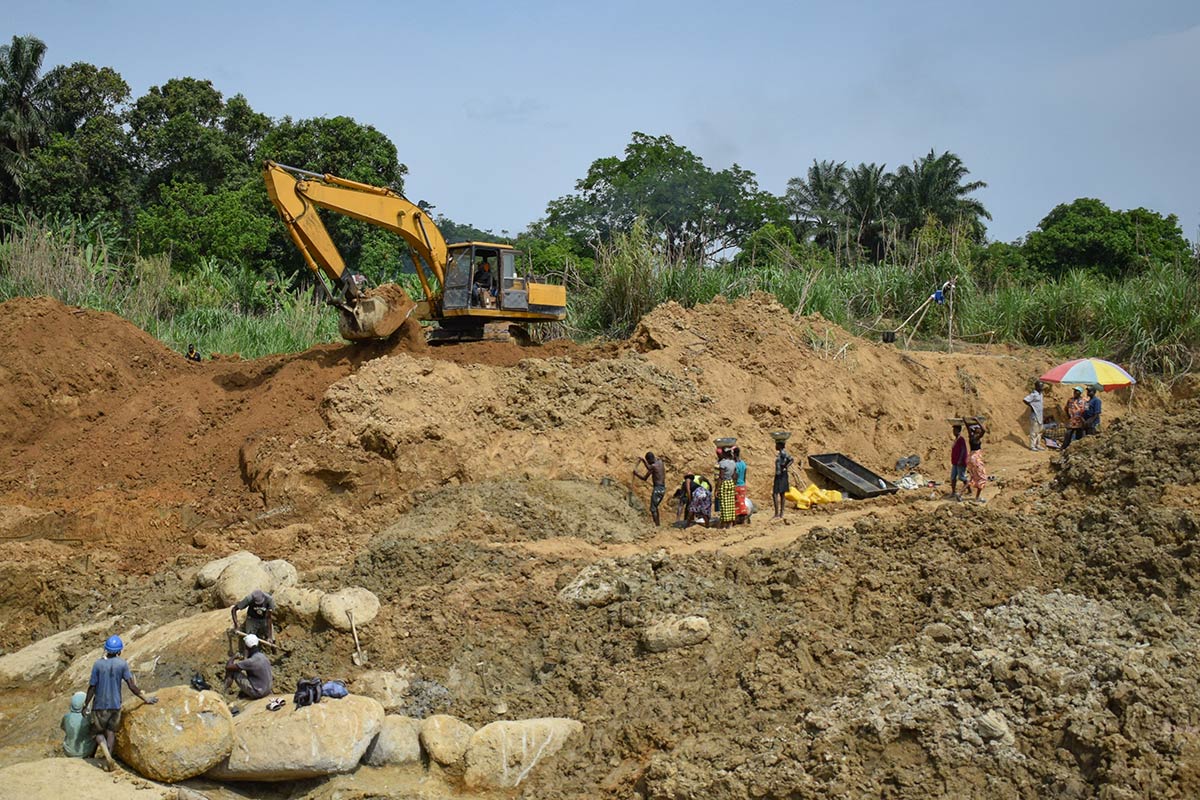 Artisanal diamond mining is becoming increasingly mechanized. (Photo: Josef Skrdlik/OCCRP)
Artisanal diamond mining is becoming increasingly mechanized. (Photo: Josef Skrdlik/OCCRP)
There are also signs that artisanal mining is beginning to give way to industrial mining. In Sefadu, a small settlement just outside Koidu, diggers are uncertain about their ability to continue mining in the surrounding fields.
“This whole area has been given to Meya Mining for exploration,” says a manager of one of the artisanal mines. “For now, we can stay, but if they decide to start mining here, we will have to go.”
Other fields have been licensed to Seawright, an American mining company, and there are also rumors that Koidu Limited is planning to further expand its operations.
The people of Koidu have thus far had almost exclusively negative experiences with Koidu Limited, at present the only international diamond mining company operating in Kono. Nonetheless, some are optimistic about industrial mining’s potential to support local development.
Ibrahim Bockarie counts himself among such people, despite still carrying a bullet wound that he received in 2007 during protests against Koidu Limited’s expansion.
“I still see them as an opportunity,” he says.
This sense of optimism is encouraged by an expected amendment to Sierra Leone’s mining legislation, which is purported to significantly increase royalties paid by mining companies to local communities.
“The key is that they pay a fair share,” concludes Ibrahim.
